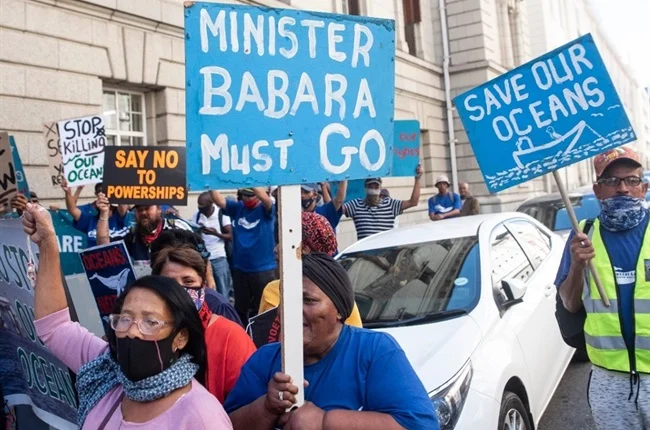According to an official from PASA, Petroleum Agency SA, Legal processes lodged by coastal communities to block oil and gas exploration effectively halted R1 billion in investment into the country.
At a pre-colloquium on the “sustainable development” of the country’s oil and gas projects in South Africa on Friday, Bongani Sayidini, chief operations officer of PASA, was frank about the government’s intentions to go ahead with developing the oil and gas industry.
The event is a partnership between PASA, the Department of Mineral Resources and Energy and the Department of Forestry, Fisheries and Environment (DFFE). It was hosted by the Sunday Times and is meant to serve as a platform to discuss balancing the goal of energy security while meeting climate change commitments.
Jacob Mbele, director-general of the DMRE, shared that oil and gas will be part of the global energy mix and that of South Africa for the foreseeable future. Gas particularly is viewed as a transition fuel to support the decarbonisation of the energy sector.
These sentiments were echoed by Sayidini, who said gas would help South Africa achieve net-zero emissions by 2050
Sayidini also expanded on South Africa’s potential oil and gas reserves. PASA estimates that there are potentially 27 billion barrels of oil and 60 trillion cubic feet (tcf) of gas reserves offshore. This is yet to be proven through exploration.
The bulk of the oil reserves is expected to be off the west coast. In recent months there have been two major oil finds off the coast of Namibia. Significant (22 tcf) gas reserves are also expected off the west coast.
ALSO READ; Steinhoff’s Pepco Group witnesses 17% increase in revenue for the third quarter.
The bulk of gas reserves – about 29 tcf – are expected to be off the south coast, coupled with 9 billion barrels of oil, said Sayidini. Some 2 billion barrels of oil reserves, along with 8 tcf are estimated to be off the east coast, he added.
It is estimated that about 200 trillion cubic feet of shale gas reserves are on shore.
Minister of Environment, Forestry and Fisheries Barabra Creecy this week issued proposed rules to manage the environmental impact of fracking – used to extract shale gas.
The DFFE issued the rules as part of court instructions after the Supreme Court of Appeal had set aside rules that were promulgated by the minister of mineral resources and energy in June 2015. According to the department, the rules were not issued in preparation for specific projects.
Sayidini suggested that South Africa’s energy security challenges could be addressed if these significant indigenous reserves are proven.
The challenge is proving them – it requires seismic surveys to locate these reserves and determine where wells can be drilled.
In South Africa two seismic survey programmes – one off the Wild Coast planned by Shell and another off the West Coast, to be conducted by Searcher – a geoscience data company – were halted by legal challenges launched by the respective coastal communities. In both cases, applicants challenged the consultation processes, which were exclusionary and thereby brought into question the validity of the permits granted for these surveys.
Searcher’s Vice President Alan Hopping had previously raised concerns that a lack of business certainty would deter Searcher from conducting future seismic surveys. But Searcher has recently reapplied for a reconnaissance permit to conduct a seismic survey off the West Coast. The survey this area is smaller and further from the coast than the previous one.
Chasing away investment
Sayidini said that these legal challenges are “chasing away” investment. He added that as much as R1 billion would have been spent if these two seismic surveys were allowed to proceed. “We halted investment of up to R1 billion, within a space of not even two months.”
While applicants, through the court processes, contended that the seismic surveys would cause irreparable harm to the environment, Sayidini suggested that there have been no negative impacts resulting from the seismic surveys that have been conducted in the country in the past decade.
“Can anyone point to any catastrophe or any negative impact the seismic acquisitions have had on the country?” he asked. He made specific reference to seismic surveys on the southern coast that led to the discovery of the Brulpadda and Luiperd gas reserves – if which Total South Africa holds the majority stake.
“If we are not enabling as a country in terms of exploration of oil and gas … we can kiss goodbye energy security, local beneficiation, economic revival and growth, as well as jobs,” said Sayidini.
Risk of litigation
In his address, Mbele said that the biggest risk to developing policies and plans for decarbonisation is litigation – which delays projects and contributes to energy security.
Mbele believes that education is key in averting misunderstandings regarding consultation. In recent months Minister of Mineral resource and Energy Gwede Mantashe has been meeting with communities in the Eastern Cape to share information about the economic benefits” of the oil and gas industry.
Civil society organisations representing Wild coast communities, however had not taken kindly to Mantashe’s actions, questioning the process.
Mbele, however, believes education will help “narrow differences”.
He said that litigation wouldn’t be eliminated entirely, but it could be minimized through information sharing.
Source: Fin24

